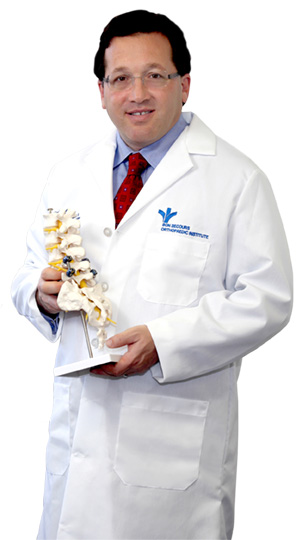 Bon Secours
Bon Secours
The Spine Center of Hampton Roads
To most, it would seem a far distance from the Federal Reserve Bank of New York to a Bon Secours operating room in Hampton Roads, but for spine surgeon Mark Kerner, it was merely a matter of leaving his career as a Systems Analyst to enroll in medical school. “I didn’t like the goals of banking,” Dr. Kerner says. “I wanted to take care of people.”
At Albert Einstein College of Medicine in New York, Dr. Kerner developed a love for the musculoskeletal system, and as an orthopaedic resident at the College’s Montefiore Medical Center, a passion for working with spine patients. During his fellowship with Dr. Arthur White at San Francisco Spine Institute, he developed a philosophy of practice that he has maintained throughout the 21 years he has practiced in Hampton Roads.
“I came to orthopaedic surgery because it has relatively concrete results,” Dr. Kerner says, “and in residency, our spine patients had both a different type and a different level of complexity than other conditions. They tended to have more life-changing, career-changing issues that dealt with pain and deformity and function. They had problems that were riskier to operate on, and I found myself drawn to it.” He had very firm ideas about how spine care and treatment should be managed for each individual patient, and how a spine practice should be organized around that care.
Moving to Hampton Roads, Dr. Kerner says he was fortunate to find a medical group that allowed him to put his philosophy into practice. Then known as Orthopaedic Surgery Centers in Portsmouth and Suffolk, the practice soon became part of the Bon Secours Health System. He remains a Bon Secours employee today, as Medical Director of the Spine Center of Hampton Roads, where his staff of physiatrists, physical therapists and others work with him in true partnership for the benefit of each patient.
His philosophy focuses finding the right diagnosis. “Classically,” he says, “most spine injuries don’t require surgical intervention. Most humans will get back or neck pain at some point in their lives, and most often it gets better on its own, or through conservative treatment.” Unfortunately, Americans tend to demand surgery when they’re in pain. “You can’t turn on the television without someone saying how miraculous their back surgery was,” he says. “Patients are being marketed to, and we have to counter market with the reality of their particular injury, especially those patients who think they’re being undervalued if surgery isn’t the first line of treatment.”
He understands: “When patients are in pain – the type of pain where their brains say they need surgery – they’re very vulnerable to an early decision for surgical resolution. But when we show them what the entire course of treatment can be, both surgical and nonsurgical options, and they understand we’re not judging their pain as unworthy of surgery, they’re more willing to be patient to allow us to try to get them better without cutting them.”
But when surgery is indicated, Dr. Kerner’s patients know that he utilizes the latest proven, least invasive techniques to hasten their recovery and maximize their outcome.
A significant portion of those patients have been referred to him after previous failed surgeries. “It’s often that their expectations weren’t properly managed,” he says. “In these cases, as in every case, our goal is to get to know each patient, to figure out what their expectations really are, and whether we can truly achieve them. It involves a lot of time, but it’s better for the patient in the long run.”

